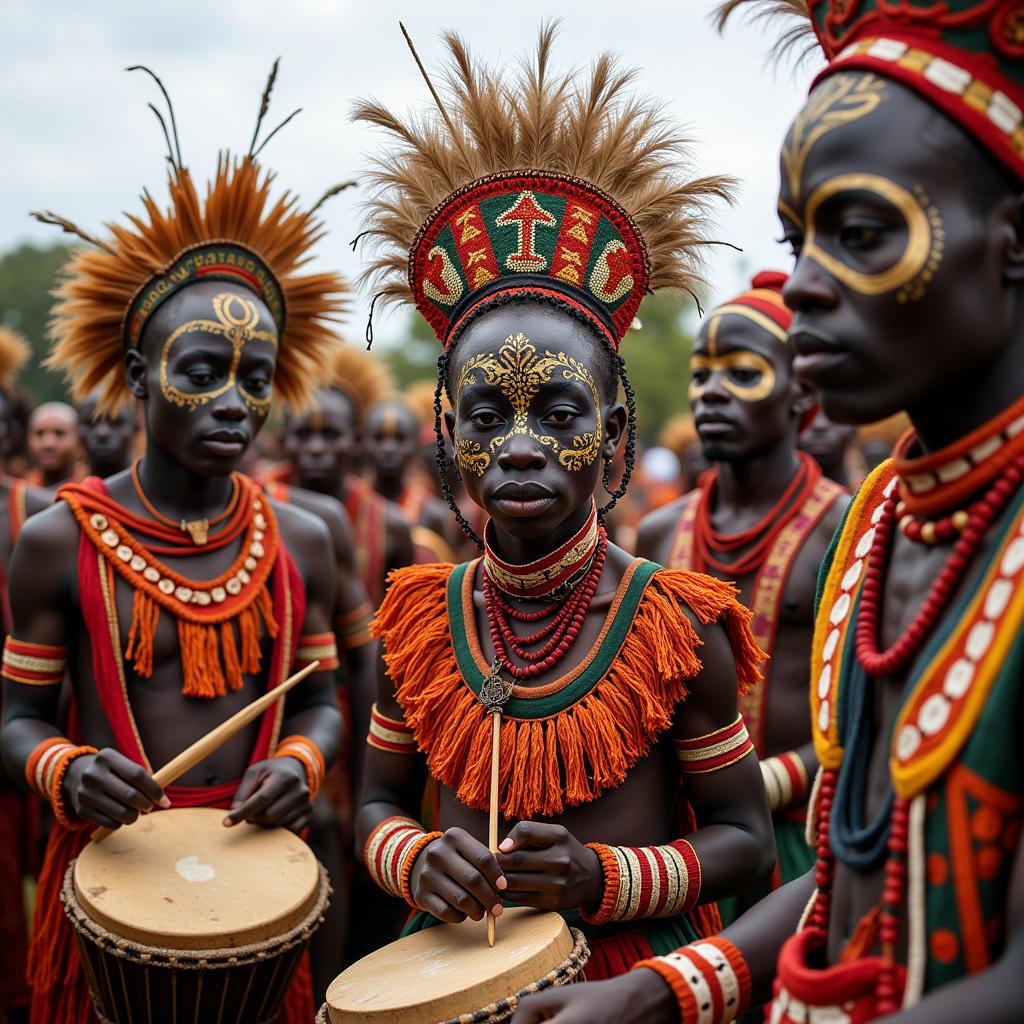A Fiery Journey: Exploring the World of African Hot Sauce
African Hot Sauce isn’t just a condiment; it’s a celebration of flavor, a testament to culinary ingenuity, and a vibrant expression of African culture. From the scorching piri-piri of Southern Africa to the aromatic berbere of Ethiopia, the continent boasts a dazzling array of hot sauces, each with its unique blend of chilies, spices, and cultural influences. This journey into the world of African hot sauce will explore the rich diversity, the complex flavors, and the deep-rooted traditions that make these condiments so much more than just a way to add heat to your meal.
From the bustling markets of Marrakech to the vibrant street food stalls of Lagos, African hot sauce plays a crucial role in everyday meals and special occasions alike. It’s the secret ingredient that elevates simple dishes to culinary masterpieces and adds a fiery kick to stews, grilled meats, and even vegetables. But beyond the heat, these sauces offer a depth of flavor that tantalizes the taste buds and leaves a lasting impression. So, let’s delve into the world of African hot sauce and discover the secrets behind its captivating allure.
Have you ever wondered about the different types of chilies used in these sauces, or the traditional methods of preparation? This exploration will take you on a culinary adventure, uncovering the history, regional variations, and unique characteristics of African hot sauces. You’ll learn about the key ingredients, the cultural significance, and even some delicious recipes to try at home. Ready to spice things up? Let’s begin!
See our African cuisine menu for inspiration on how to use these amazing sauces.
The Heart of the Heat: Chili Peppers in African Hot Sauce
African hot sauces owe their fiery character to a variety of chili peppers, each contributing its own unique flavor profile and level of heat. From the mild, fruity heat of the bird’s eye chili to the intense burn of the Scotch bonnet, African cooks utilize a diverse range of peppers to create sauces that cater to every palate. The specific chili used often depends on regional availability and cultural preferences.
Regional Variations in Chili Use
Different regions of Africa favor different types of chilies, leading to a rich variety of hot sauce flavors. North African cuisines, for instance, often incorporate the spicy, smoky flavor of dried chilies like the pul biber, while West African dishes frequently feature the vibrant heat of the Scotch bonnet pepper. Understanding these regional variations helps appreciate the nuanced complexity of African hot sauce.
Beyond the Burn: Exploring the Flavor Profiles
While heat is undoubtedly a defining characteristic of African hot sauces, they are far more than just a source of fiery intensity. They are complex condiments with a depth of flavor that stems from a blend of aromatic spices, herbs, and other ingredients.
A Symphony of Spices and Herbs
African cooks skillfully blend a variety of spices and herbs with chilies to create unique flavor profiles. Common additions include ginger, garlic, cumin, coriander, and even smoked paprika, each contributing its unique aromatic touch to the overall flavor. These spices not only enhance the heat but also add layers of complexity, making each sauce a sensory delight.
“The beauty of African hot sauce lies in its versatility,” says Chef Adebayo Olaniyi, a renowned expert in West African cuisine. “It’s not just about the heat; it’s about the interplay of flavors, the balance of spice and aroma.”
From Market to Table: Traditional Preparation Methods
African hot sauces are often made using traditional methods passed down through generations. These techniques vary from region to region, adding to the diversity and uniqueness of the final product. Some sauces are fermented, while others are cooked, resulting in a range of textures and flavors.
Preserving the Flavors of Tradition
Whether ground on a stone or blended with a mortar and pestle, the preparation process is crucial to the final flavor of the sauce. Sun-drying, fermenting, and roasting are common techniques employed to enhance the flavors and preserve the sauce for extended periods. These time-honored traditions are an integral part of African culinary heritage.
Looking for a specific type of African hot sauce? Check out this african hot sauce crossword clue.
Conclusion: A Taste of African Culture
African hot sauce is more than just a condiment; it’s a symbol of African culinary creativity and cultural heritage. From the fiery piri-piri to the aromatic berbere, these sauces offer a tantalizing journey through the diverse flavors of the continent. Whether you’re a seasoned chili enthusiast or simply curious about exploring new tastes, African hot sauce is sure to ignite your senses and leave you craving more.
FAQ
- What is the hottest African hot sauce? Many consider piri-piri to be among the hottest, but it depends on the specific chilies used.
- Where can I buy authentic African hot sauces? Specialty stores, online retailers, and even some local markets offer a growing selection.
- What are some popular uses for African hot sauce? Everything from grilled meats and stews to eggs and vegetables.
- Are all African hot sauces extremely spicy? No, the heat level varies depending on the ingredients. Some offer mild, fruity heat, while others are intensely fiery.
- How can I incorporate African hot sauce into my cooking? Start by adding small amounts to your favorite dishes and adjust to your preferred level of heat.
- Are there vegetarian versions of African hot sauce? Yes, many recipes rely on plant-based ingredients, excluding any animal products.
- How long can I store homemade African hot sauce? Properly refrigerated, homemade sauces can last for several weeks.
Have you tried adding hot sauce to your african cow skin kpomo recipes?
For other African recipe ideas, you might enjoy this helpful resource: African chef menu. Or, try an African hot sauce crossword for fun!
Need more information? Check out our other blog posts on African cuisine and culture.
For assistance, contact us 24/7: Phone: +255768904061, Email: kaka.mag@gmail.com, or visit us at: Mbarali DC Mawindi, Kangaga, Tanzania.




